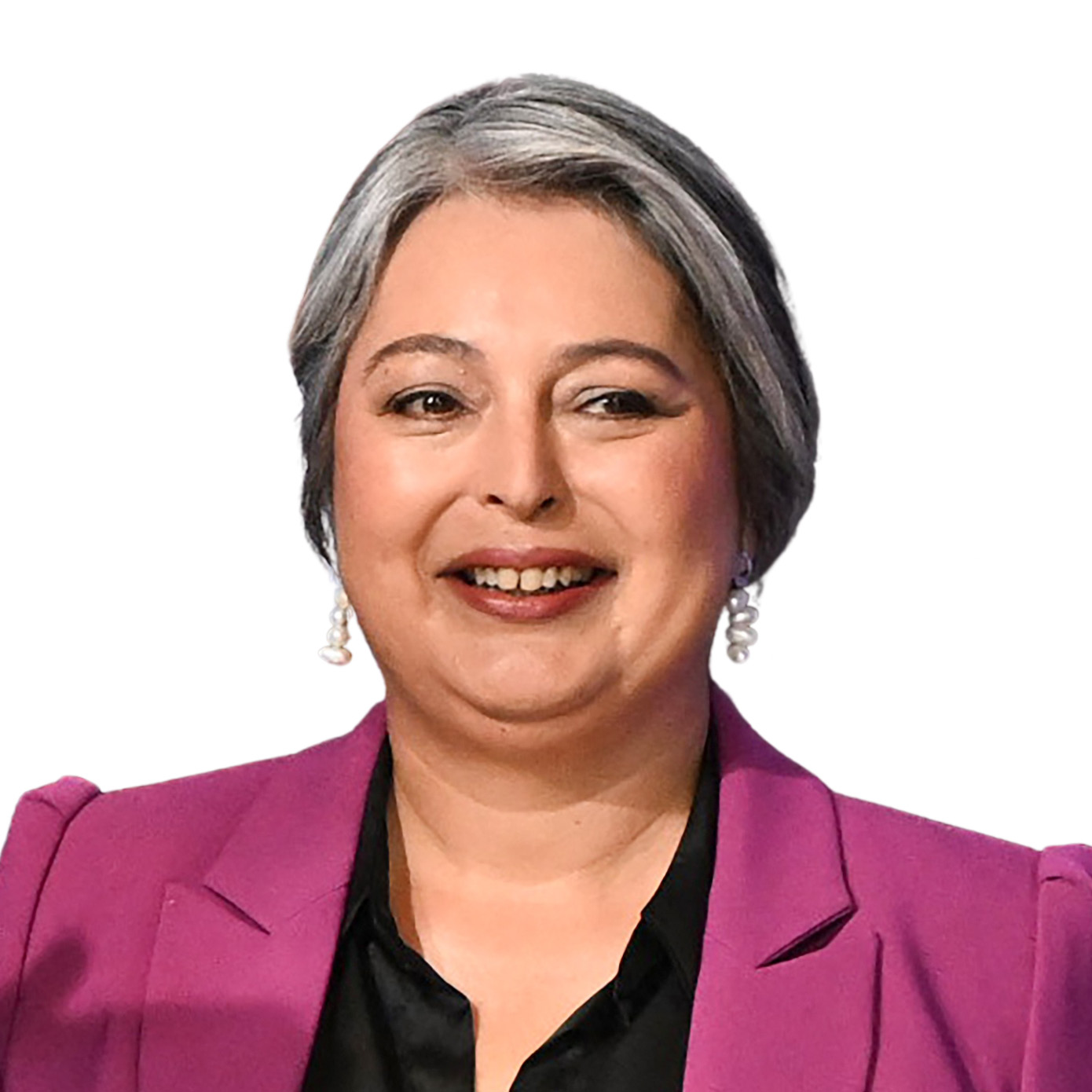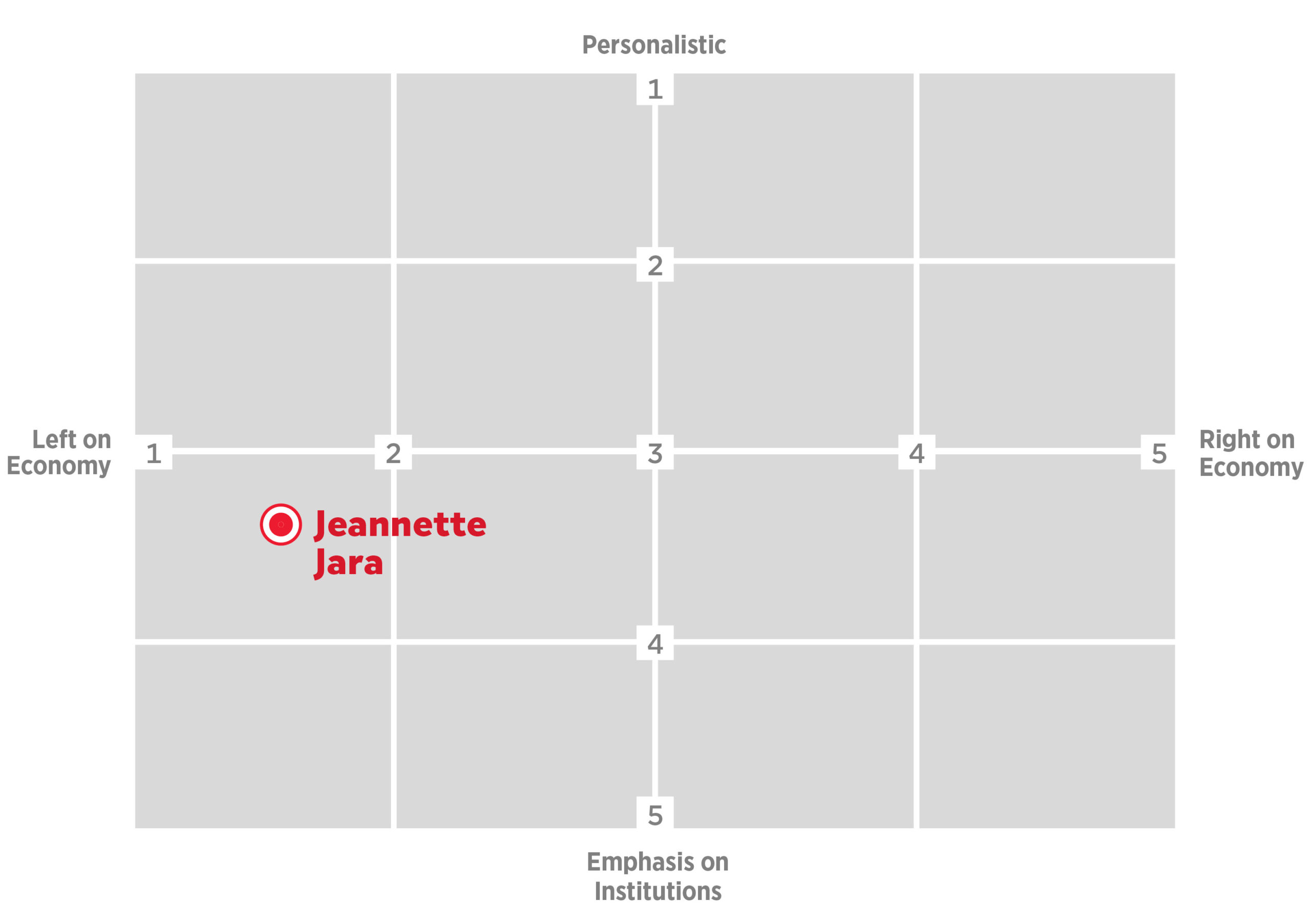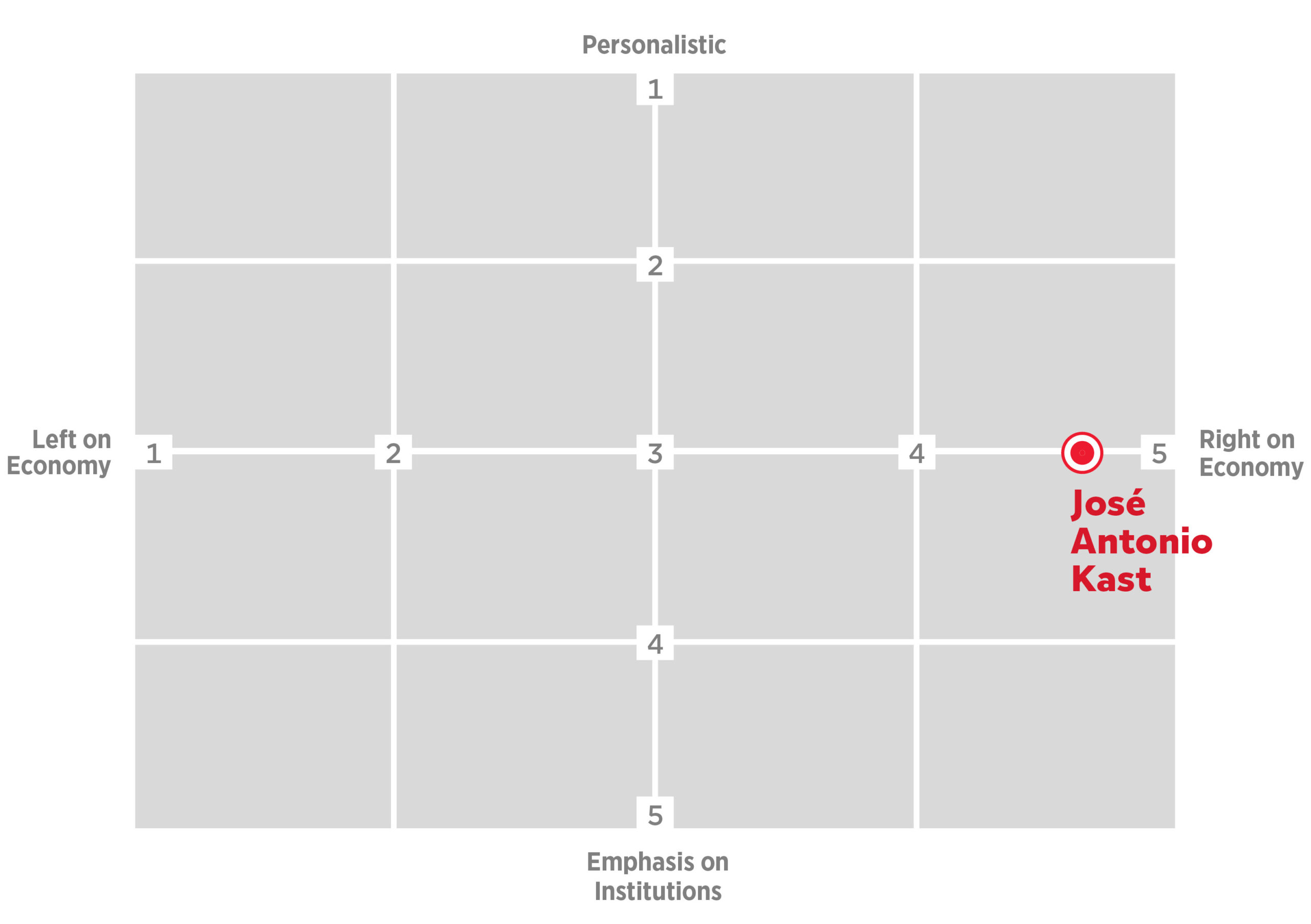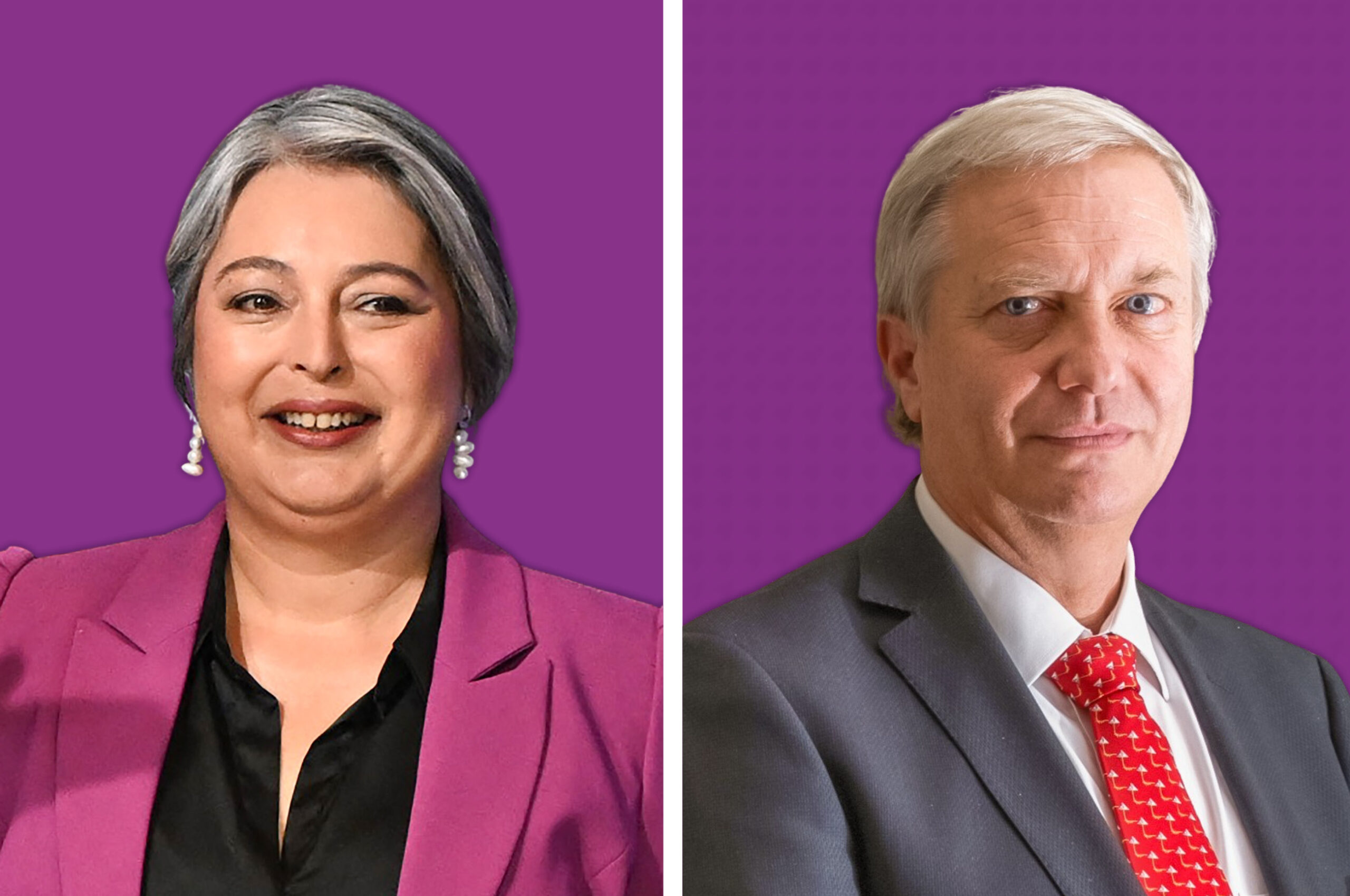This page was updated on December 10
With crime, immigration and unemployment among their top concerns, voters headed to the polls on November 16 for the first round of Chile’s presidential election. Jeannette Jara of the Communist Party secured 26.85% of votes and José Antonio Kast of the Republican Party won 23.92%, and will compete in the runoff on December 14.
AQ asked a dozen nonpartisan experts on Chile to help us identify where each candidate stands on two spectrums: left versus right on economic matters, and personalistic versus institutionalist on leadership style. We’ve published the averages of their responses, with a caveat: Platforms evolve, and so do candidates.
We will occasionally update this page to reflect developments in the campaigns.

Jeannette Jara
51, former labor minister
Partido Comunista de Chile
“I come from the real Chile. I am not one of those people who were born into the elite.”
HOW SHE GOT HERE
Jara had a relatively low public profile before serving in President Gabriel Boric’s Cabinet from March 2022 to April 2025. She has been a member of the Communist Party since the age of 14, and was a student and union leader. During former President Michelle Bachelet’s second term, Jara served as undersecretary of social security (2016-18). Jara was the surprise winner of June’s left-wing primary, securing 60% of the vote.
WHY SHE MIGHT WIN
Jara has emphasized her working-class origins, which may resonate with voters who perceive politics as elitist. Her ministerial portfolio covered areas where the Boric administration scored legislative victories: a minimum wage increase, a reduction in the workweek from 45 to 40 hours, and a long-awaited pension reform. Since her primary victory in June, she has pivoted to the center, backtracking on previous positions such as a proposal to nationalize copper and comments made in April about Cuba. Jara later clarified that she thinks the island nation is not a democracy.
WHY SHE MIGHT LOSE
Her longstanding ties to the Communist Party and association with Boric, whose approval ratings have been in the 30% range for most of 2025, might alienate voters. Many are in an anti-incumbent mood faced with economic stagnation and an 8.4% unemployment rate. Voters may conclude a conservative candidate is better positioned to address crime and immigration, which polls show are Chileans’ leading concerns. Polls also indicate that as of late November, Kast had a 12-16 point lead over Jara. Despite winning the first round, Jara had a relatively low vote share compared to the right-wing candidates, who together secured just over 50% of votes.
WHO SUPPORTS HER
Jara is likely to receive support from Boric’s voter base, and her Unidad por Chile coalition includes eight parties ranging from the left to the center-left. The Christian Democratic Party has also endorsed her.
WHAT SHE WOULD DO
Jara’s program promises to introduce a minimum income of $780 per month through gradual minimum wage increases, cash transfers to workers, and subsidies for small businesses. This initiative would carry an estimated cost of $300 million, according to her economic advisor. She has committed to modernizing the police, building five new prisons by 2033, and exercising presidential power to deploy the armed forces to protect Chile’s borders. Jara has stated that Venezuela has an authoritarian regime, and that if elected, she would “maintain the appropriate diplomatic relations” with Presidents Donald Trump and Javier Milei.
IDEOLOGY


José Antonio Kast
59, former member of the lower house of Congress
Partido Republicano
“Don’t be fooled: The upcoming election is about change or continuity. This administration has been a complete failure, and there is nothing to salvage.”
HOW HE GOT HERE
Kast is running for president for the third time. He earned 7.9% of the vote in 2017 and won the first round in 2021, but lost to Boric in the runoff. A lawyer by training, Kast served in Congress from 2002-18. He left the right-wing Unión Demócrata Independiente party in 2016 and founded his own ultra-conservative party in 2019. Kast was a vocal opponent of Chile’s left-led constitutional rewrite effort in 2022, and his Partido Republicano had the largest representation on a council that proposed a right-wing constitution in 2023, which voters also rejected by referendum.
WHY HE MIGHT WIN
Kast’s hardline security and immigration policies may gather more support amid rising migration and perceptions that crime has increased recently. Although Chile’s homicide rate has declined since 2022, it is twice the rate seen a decade ago and other crimes are also high. Kast has spoken in favor of the security model promoted by El Salvador’s President Nayib Bukele, a popular figure in Chile. Having consistently campaigned throughout the country in recent years, Kast has high name recognition and presents himself as a stark contrast to Boric. The first round results indicate significant support for right-wing candidates, and Kast leads Jara in voter intention.
WHY HE MIGHT LOSE
While Kast is overwhelmingly favored to win the runoff, if Jara continues pivoting to the center and distancing herself from the Boric administration, she may attract more moderate voters than Kast.
WHO SUPPORTS HIM
Those seeking a radical change from the Boric administration may cast their ballots for Kast, along with those who share Kast’s conservative social positions. He stands to attract voters whose primary concern is crime and violence, which applied to 63% of Chilean respondents in an October Ipsos survey. Former polling frontrunners Johannes Kaiser and Evelyn Matthei, who placed fourth and fifth in the first round, respectively, have endorsed him, as has the family of late former President Sebastián Piñera.
WHAT HE WOULD DO
Kast’s government program describes a security, economic and social “emergency.” He proposes closing borders to undocumented migrants and criminalizing irregular migration, as well as building border ditches and walls. Kast promises to expand and modernize Chile’s prison infrastructure, including maximum-security facilities. His program sets out plans to increase the annual GDP growth rate to 4% (the IMF forecasts a 2% economic expansion for this year), lower the corporate tax rate, and cut public spending by $6 billion over 18 months.
IDEOLOGY







